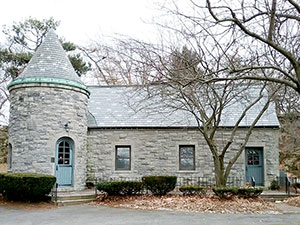 Eagle Feathers #286 – Freedom
Eagle Feathers #286 – Freedom
By Bob (Monty) Doherty
Happy Birthday Powder House! You are the most ancient, historic structure in Somerville and the most distinct antique ruin in Massachusetts. After standing on Quarry Hill for the last 320 years, the renowned Old Powder House has earned our respect. A forty-two-inch plaque on the northerly side of this ancient arsenal records:

“This Old Mill, built by John Mallet on a site purchased in 1703-04, was deeded in 1747 to the ‘Province of the Massachusetts Bay Colony of New England’ and for many years was used as a public Powder House. On Sept. 1, 1774, General Gage seized the 250 half-barrels of gunpowder stored within it and thereby provoked the great assembly of the following day on Cambridge Common, the first occasion on which our patriotic fore- Fathers met in arms to oppose the tyranny of King George III; in 1775 it became the magazine of the American army besieging Boston. This tablet was placed by the Massachusetts Society of Sons of the Revolution Sept. 1, 1892”
Oxford, Massachusetts lies in the southern part of Worcester County, one town away from the Connecticut border. As early as 1682, the Bay Colony offered land grants to this area for people who would colonize the then unbridled frontier land. In 1686, a group of forty French Huguenot families settled the territory and established a village. They had fled Europe to come to America for religious independence. Like the English pilgrims who formed a plantation at Plymouth, they formed a settlement in Oxford.
During the nine years of the Huguenot’s colonization, they had suffered kidnappings and chaos with renegade Indians ending with a family being massacred. After this tragic event and later a Deerfield Village attack which took over fifty lives, the settlement broke up. One of the fleeing Huguenots was Jean Mallet and his family. The Mallets helped build three mills before leaving Oxford. After arriving in Charlestown/Somerville, Mallet applied what he knew by building a grist mill, which is today’s historic Powder House.
The Somerville mill still proudly stands over 320 years later. It was protected by one of Ben Franklin’s early lightning rods rising from its peak and is today the oldest man-made stone structure in the state. On September 1, 1774, the site was attacked by British troops who captured the colonial gunpowder that was stored there. This was eight months before the Battle of Lexington, making it the dress rehearsal to the American Revolution.
The proud 320-year-old Somerville blue stone lady was born struggling for freedom in 1703 to 1704. Her freedom was tested again during the birth of our nation in 1774 and today still symbolizes freedom for all of us.

 https://www.portersquarebooks.com/
https://www.portersquarebooks.com/













“Unbridled frontier” as long as you deny the very existence of the peoplea who already lived there.
The propaganda/myth that Plymouth was founded for religious reasons needs to die. The vast majority were there to make a profit.
Funny how people defending some barrels are “patriots” but Indians defending their home and very existence are “renegades.”
This line struck me too, “During the nine years of the Huguenot’s colonization, they had suffered kidnappings and chaos with renegade Indians ending with a family being massacred. After this tragic event…” While I am not familiar with the exact history of the native tribes in the Oxford area, based on the overall history of the colonization of Massachusetts, I am certain that they also experienced many “tragic events” at the hands of the colonizers, so using terms such as “renegade Indians” promotes a very one-sided interpretation of that history from the viewpoint of those doing the colonizing. The native tribes are still here, and thoughtless writing like this still causes harm to all who read it – Massachusetts history should not be white-washed.